How To Scalp Betfair Exchange: The Ultimate Guide

Scalping on Betfair Exchange is the perfect place for beginners to start making easy money. Once you know what you’re doing, it doesn’t take long to start placing quick trades and scalping on Betfair Exchange.
In this guide, we’re going to teach you how to start scalping and the strategies to get you earning.
What is Scalping?
Scalping is the art of making small profits on short-term price fluctuations in a betting market.
Even though the profits themselves are small, it is simple to make a high volume of trades in a short time.
You might only make £3 profit per trade, but it is quite easy to do this around 25 times on any given day, with the right software.
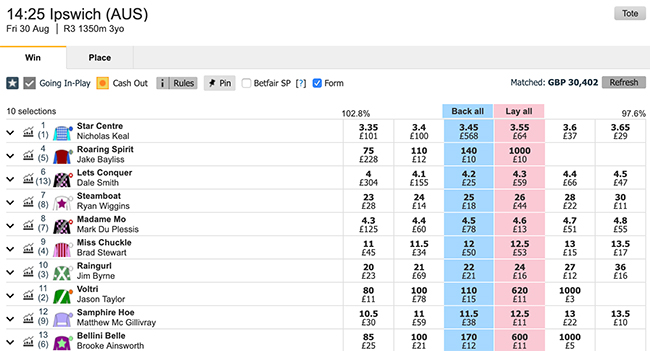
This is a good example of the kind of market to look for; high volume and plenty of money moving through.
How Does Scalping Work?
To be successful in scalping, finding the right market is key.
High volume, fast-moving markets work best with scalping. This usually occurs with very popular events on a busy day of the week, usually the weekend.
Horse racing is a market that is favoured by scalpers.
For horse racing, we would place both a back and a lay bet on the same horse. This means we are betting that the horse will win, and betting that the same horse will not win.
This sounds silly, but not when you take into account highly fluctuating odds.
It doesn’t matter whether you place your back bet or lay bet first. The important thing is to make sure you are ‘offering’ a price.
Once this price is matched, we can ‘sell’ the bet back to the market at a profit. This is usually just 1-5 ‘ticks’ difference, for example, backing at 3.25 and laying at 3.20.
Scalping is all about predicting rapid movements in price in a market.
For example, if a well-known broadcaster provides a tip on a horse race, this will cause more bets to be placed and hence cause the odds to fluctuate.
The best scalpers get in early and correctly predict the price movement. Then they exit the market as fast as possible in order to limit exposure and risk.
This ‘speed of exit’ is something that scalping software offers and is definitely worth the investment if you are committed to getting started with scalping.
A Scalping Example
If we place a back bet for Madame Mo for 4.6 and a lay bet at 4.5 we get the following result.

As you can see in the above example, if our bets are matched, we will win £10 if Madame Mo wins, and will break even if another horse wins.
This is scalping in its simplest form. It just relies on both bets being matched!
To have these bets matched, we need to be able to predict quick movements in the price and be equally quick in placing our bets.
This process can be done multiple times for the same event, building up your potential for profit.

We can also ‘hedge’ our position when scalping. In the above example, we will win £10 if Madame Mo wins, but we will only break even if another horse wins.
Hedging means to spread out this £10 over the rest of the possible outcomes.
The simplest way to do this is to increase the size of our lay bet, proportional to the £10 potential winnings. This can be fairly complicated to work out, but can be done automatically using scalping software.
In the second example, you can see that by adjusting our lay bet by £3, we can secure a profit across all the outcomes of this race.
We will win £2.60 if Iwo Jima wins, and we will win £3.00 if any other horse wins.
This is the way we can guarantee a small profit even if we don’t pick a winner.

When done correctly, this means that we can guarantee ourselves a profit whatever the outcome, albeit smaller than the £10 we would win if we got lucky with Madame Mo.
How Do I Get Started Scalping?
The first thing to do is to decide which market is best for you.
The most common choice is horse racing, but scalping can be done with almost any sport on Betfair. It is best to become familiar with the market you are trading in before placing any large stakes.
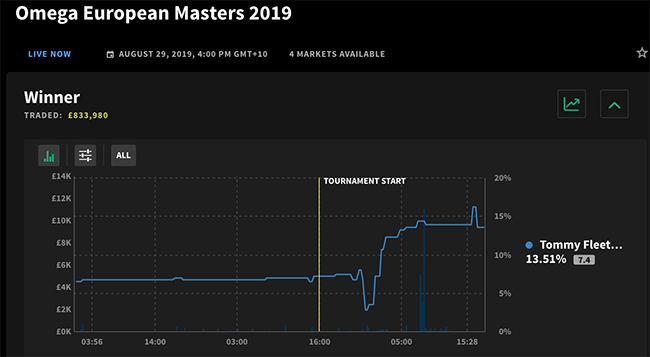
When you are getting started, it is sensible to just watch how the odds fluctuate leading up to, and during an event.
This will give you a good idea of how much you can stake without taking on too much risk, and when the best time to place your bets is.
You can opt to purchase scalping software and pay a monthly or annual fee for using it.
This is usually a sensible idea, and we will discuss various types of software and their relative advantages and disadvantages later on in this guide.
Should I Scalp Pre-Event or In-Event?
There are advantages and disadvantages to scalping either before an event, or scalping in-play.
Scalping in-play is more of a high-risk, high-reward strategy. You can judge this for yourself by observing the fluctuation of odds over the course of an event. There is much more variance during the event than beforehand.
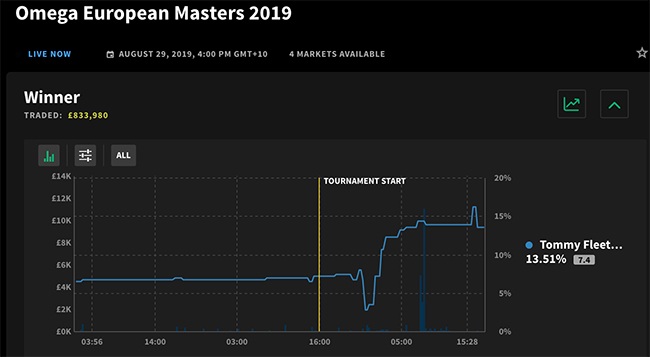
The above chart shows just how much odds can fluctuate during an event compared to beforehand.
Leading up to the start of the tournament, all of the odds were pretty much stable, but after just a couple of hours, they began shifting by large margins.
Fluctuations during an event tend to be ‘bouncier’ than before the event begins.
Before an event, a change in odds is often due to a somewhat quantifiable event occurring, such as one of the horses being injured before a horse race. The odds will adjust to this news and eventually settle at the new price.
If you are very knowledgeable about horse racing and able to quickly take advantage of news about a race before it starts, you can be profitable scalping before an event.
However, the markets tend to be smaller leading up to an event, growing in size as the start of the event approaches.
Most bets come in just before the start of a race, causing new odds fluctuations. This is the time that many scalpers choose to place their bets.
Scalping during an event is more risky. For horse racing, you run the risk of having a horse you have just bet on falling at the next hurdle before you can exit your position, and losing you your entire stake.
If you are going to scalp during a horse race, it is worth following a few rules; only scalp on races longer than 1.2 miles, scalp only one horse per race, and only scalp between hurdles if the race has jumps. This should help prevent you from losing your stake due to an unfortunate mishap.
Do I Need An In-Depth Sporting Knowledge?
Scalping is, for many people, a form of cold trading.
This means that the person placing the bets has very little information regarding the reasons why odds may shift. However, there is still a lot of understanding required.
Cold traders make money by understanding and reacting to the flow of money in a market. This does not necessarily require in-depth knowledge of the market itself.
Traders who bet based on form and other similar metrics are betting based on what they predict will happen.
Cold traders are betting based on what is actually happening. This is why cold traders need to react quickly to perceived price shifts.
However, there is still value in being knowledgeable about your chosen market. In horse racing, for example, you might see a horse rearing up just before the start of a race, implying that the horse is uneasy.
This can be valuable information in the right hands. Specialist knowledge such as this always comes over time and with experience.
Three Tips to Improve Your Scalping
For horse racing, there are a few simple tips for beginners that can help you when you are just starting. These tips can also be applied to other sports.
- Never chase profits. It is easy to see things going your way and get greedy. Always think in the long-run, and take your small profits when you can. Guaranteed profit, even if smaller, is always better than gambling with high risk. If you want to gamble for fun then you can take risks, but if you are serious about making money using scalping, reducing all risk is key.
- Pick your market. The difference between success and failure can come down to the market you pick. For scalping to be successful, you need a highly liquid market with a lot of trading going on. Picking a relatively quiet event can erode your profits in just 2 or 3 misplaced bets.
- Start small. If you are just getting started scalping, it is sensible to start with small stakes. Only go for low odds and the most liquid markets at first, so you can build your confidence.
Do I Need Specialised Software?
Scalping successfully relies on being able to rapidly exit out of your position.
To increase the speed at which you can make your trades, there are several different kinds of software available that are specialised for scalping.
The software also provides you with the ability to monitor multiple markets at once. Plus they offer help and support to get you started, or back up and running if you are having difficulties.
Geeks Toy
Geeks Toy is one of the most popular pieces of software for scalpers on Betfair, and they also support Betdaq and Matchbook.
They are currently offering a 14-day free trial for their Betfair version, which is well worth taking advantage of.

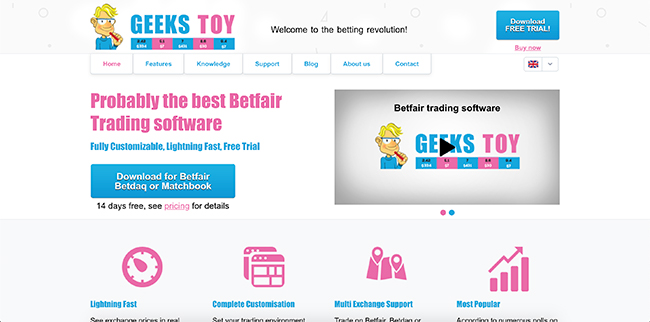
The layout and interface of Geeks Toy take some getting used to if you have never used betting software before, but they offer a comprehensive guide for free on their website.
At just £20 for a 3-month subscription, Geeks Toy certainly offers value for money. The right software can make the difference between success and failure in scalping, so £20 is a fair price to pay when you take your potential profits into account.
One of the best features of Geeks Toy is the practice mode.
With this tool, you can place bets without having to put up the money. Once you feel you are well-trained enough, you can start putting your own capital forward and making some real money.
Bet Angel
Bet Angel is another similar piece of software that can be used for scalping Betfair Exchange. Many of the features are basically the same as Geeks Toy. However, there are a few differences.
Unlike Geeks Toy, Bet Angel offer automation of trading. This means you can set up your parameters for the software to follow. Then simply leave the program running while you go about your business.
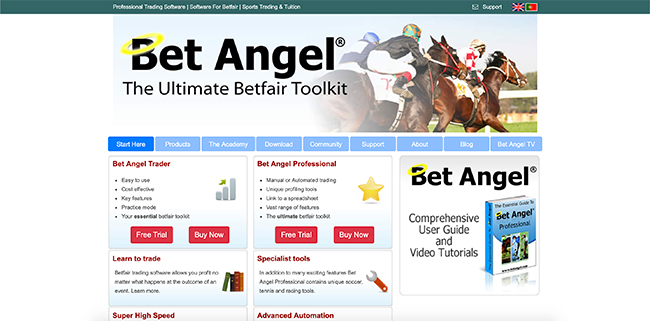
Clearly, automating your trading is desirable, but only works when you have a clear strategy and know when to change it. Without this, there is a huge potential to lose money if things start going wrong.
Bet Angel offers a free trial for 14 days. After that, an annual subscription is £60, with a three-month subscription coming in at just £18. Bet Angel also offers a premium service that offers even more features, for £149.99 for one year.
It is also possible to stream events through the live video service provided by the software.
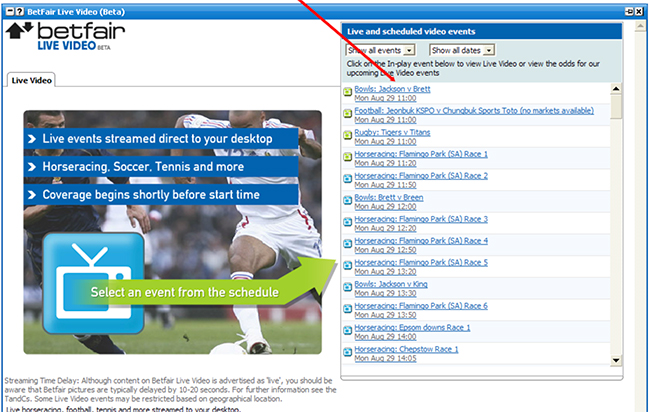
What are the Advantages of Using Software?
When it comes to scalping, the main advantage of using specialised software comes down to the speed at which it enables you to place your bets.
Both Bet Angel and Geeks Toy give you the ability to place trades instantly.
This means you can limit your exposure to the market, and exit out of your position as quickly as possible. Therefore, you are less likely to get yourself into a situation where you are having to back out for a hefty loss.
You can also link up your own betting spreadsheet to the software, which allows for more accurate record-keeping.
Having the ability to keep records of your trading is a big help in the long run. It provides you with the ability to see where your main successes and failures are coming from.
How Much Money Can I Make From Scalping?
When you first start scalping, you should keep your stakes low to avoid making costly mistakes. However, once you are more confident, you can consistently make a decent sized profit.
If you pick a good, busy day to scalp on, such as a Saturday, it is certainly possible to make around £3-4 per race. This can be done over about 25-30 events on a given day, so your daily profit can be up to £120 at this point.
Once you are very confident, you can increase the size of your stakes. This gives you the potential to earn even more money, but the risk is of course higher.
Many scalpers settle for making under £5 per race to limit their risk.
Thanks for reading this guide on Scalping Betfair Exchange.
If you don’t have a Betfair account, you can sign up here.
About the Author
This post was written by Andy Beggs. Andy is a keen sports fan and has been writing for Beating Betting from his home in Australia since August 2019.
